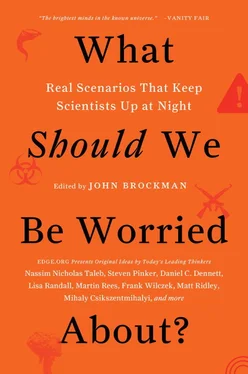The broadening of the community with whom individuals feel mutual dependence is generally the result of factors promoting collective action: incentives, punishments, monitoring over time. But with a push from the behavioral economists, we now recognize the equal importance of appeals to fairness and the creation of emotional attachments. At least some people, some of the time, will make individual sacrifices in order to combat unfairness. What Elisabeth Wood labels “the pleasure of agency” can motivate actions that serve a larger whole. As Ernst Fehr, Samuel Bowles, and others find, implicit and emotional incentives can lead to complementarities rather than substitution of intrinsic and extrinsic motivations.
So the good news is that communities of fate can be expanded to include strangers and future generations. But there is a problem here—and two additional sources of worry. First, we are far from figuring out how to use our scientific knowledge about our interdependencies to make more people aware of their shared welfare. How do we extend what we have learned from the lab and case studies to a larger set of institutions and organizations? Second, and even more troubling, the mechanisms that draw people out of their narrow self-serving behavior can be used for good or ill. Terrorists and other zealots of the religious, nationalist, or political kind believe they are serving a larger collective good, at least for those within their definition of the collective to be served, and many sacrifice for their cause. How do we inhibit these groups and promote the governments and organizations that serve a wider public? That is, indeed, a problem worth worrying about.
STEPHEN M. KOSSLYN
Psychologist; director, Center for Advanced Study in the Behavioral Sciences, Stanford University; coauthor (with William Thompson & Giorgio Ganis), The Case for Mental Imagery
ROBIN S. ROSENBERG
Clinical psychologist; author, Superhero Origins: What Makes Superheroes Tick and Why We Care
As the 21st century proceeds, tasks facing our species will become increasingly complex. Many problems that in an earlier era might have been easily addressed by one person will now require a sophisticated set of abilities contributed by different people. The individual contributions must be complementary; the whole must be more than the sum of its parts.
This much seems obvious. But no part of contemporary formal education—at any point from kindergarten through postgraduate work—is designed to teach people how to interact effectively with other people in goal-oriented groups. When such a group functions well, it synergizes the talents and abilities of its members. But at present such synergy occurs because of a lucky combination of people who happen to have complementary skills and abilities relevant to the task at hand, and who happen to be able to interact effectively. It’s not obvious how best to compose a group to facilitate such synergy. But most people don’t seem aware that there’s a problem here.
For example: Many people who interview job applicants think they’re good at picking the “right” applicant—that they know how to pick appropriate employees based not just the content of an applicant’s answers but also on his or her nonverbal behavior. But it has been repeatedly shown that interviewers who rely on intuition and “feeling” generally are not good at picking job applicants.
So, too, with selecting people to work together in goal-oriented groups. People have intuitions about how to assign individuals to groups and how to organize them, but decisions based on such intuitions are not necessarily any better than chance. Relying on the luck of the draw won’t be very effective as task-oriented groups face increasingly complex challenges. We must overcome such intuitions. We need to realize that understanding how best to select the right people for the right group is a hard problem—and so is understanding how they should interact most effectively.
To compose a group that can effectively tackle a complex problem, we need to know (1) how to analyze the nature of tasks, in order to identify the necessary skills and abilities; (2) how to identify such skills and abilities in individuals; and (3) how different sorts of people can interact most effectively when working on a particular sort of task. Much research will be required to crack these problems (and such research is already under way), but the results will not be widely applied as long as people don’t recognize the nature of the problems and why they are important.
Science can do better than intuition—but we first must understand that intuition isn’t good enough. And this isn’t intuitively obvious.
GLOBAL COOPERATION IS FAILING AND WE DON’T KNOW WHY
DANIEL HAUN
Leader, Comparative Cognitive Anthropology Group, Max Planck Institute for Evolutionary Anthropology
More than ever, we depend on the successful cooperation of nations in making planetary-scale decisions. Many of today’s most dire problems cannot be solved by actions taken within single countries but will find solutions only if the global community joins forces. However, global cooperation is mostly failing, even if the problem is well defined and the options for action fairly well understood. Why? One answer is that humans’ narrow pursuit of their own interests will trump any possibility for collective action. This explanation is as insufficient as it is pessimistic. If this were the heart of the problem, failure would be inevitable. We are not going to change human nature in time.
• The good news is that inherent human self-interest, while not exactly making things easy, is not the only reason that global cooperation is failing. As well as being inherently self-interested, humans, it turns out, are inherently cooperative. From an early age, children are able and, even more important, highly motivated to interact with others in order to accomplish common goals. Kids enjoy cooperating. Moreover, other primates seem to have many of the basic abilities necessary for cooperation. Hence, cooperation appears to have been part of humans’ biological history for a long time, with many of the necessary abilities and motivations heritable. Even human adults choose cooperation over defection, unless they are given too much time to think about it. When making decisions quickly, people’s gut reaction is to cooperate. We cooperate much more than we might predict based on self-interest alone. Cooperation is as much part of human nature as is self-interest, so it’s not a foregone conclusion that global cooperation will always fail. The challenge is to build a context for global cooperation that brings out our cooperative side.
• The bad news is that we have no idea how to do that. That’s because we don’t know how cooperation works when you go from small groups of people to a planet-wide level. We come to this problem at crunch time with empty hands. We should worry about that.
• What we do know is how to build a context that promotes cooperation among limited groups of individuals (local cooperation). For example, local cooperation works well when the chance for reciprocation is high and the cooperators trust one another. Individuals cooperate better when the channels for communication are effective, the cooperators think of themselves as similar to one another, and the system allows for cheaters to be punished. What we don’t know is how these factors operate in a global-cooperation scenario. But isn’t global cooperation just like local cooperation except with lots more individuals? Can’t we just take what we know about local cooperation and extrapolate to a group of 7 billion? The reason global cooperation fails could simply be that reciprocation, trust, communication, punishment, and interindividual similarity are all compromised on that scale. If this were the heart of the problem, again, failure would be inevitable. Luckily it isn’t. Because that’s not how global cooperation works.
Читать дальше












